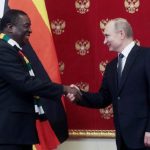Looking to the future of Zimbabwe, Ministers have previously referred to the PVO amendment Bill in this House, which could restrict civic space even further. Can the Minister detail what recent assessment the FCDO has made of the potential for that Bill to pass, and the consequences of its implementation?
Human rights in Zimbabwe remain a serious concern across this House and, unfortunately, the recent events during the elections form part of a pattern. The EU’s observer mission found that the state’s actions in the post-election period undermined the integrity of the elections. The mission stated that “the restrictions on political freedoms, the excessive use of force by security forces and abuses of human rights in the post-election period undermined the corresponding positive aspects during the pre-election campaign” and that, as the noble Lord, Lord Oates, said, “many aspects of the 2018 elections in Zimbabwe failed to meet international standards.”
I hope that the Government will continue to hold the President of Zimbabwe to account, and that the Minister can outline specific actions by the department on how it intends to do that in the months ahead.
17:19:00
The Minister of State, Department for the Environment, Food and Rural Affairs and Foreign, Commonwealth and Development Office (Lord Goldsmith of Richmond Park)
 My Lords, I thank the noble Lord, Lord Oates, for tabling this debate and for his continued interest and tenacious advocacy as co-chair of the APPG on Zimbabwe, which has been of huge benefit to the House. I thank all noble Lords for their insightful contributions.
My Lords, I thank the noble Lord, Lord Oates, for tabling this debate and for his continued interest and tenacious advocacy as co-chair of the APPG on Zimbabwe, which has been of huge benefit to the House. I thank all noble Lords for their insightful contributions.
The by-elections of 26 March were the first that Zimbabwe has held since the start of Covid regulations in 2020. While the delay in convening the polls was a concern, we welcome the Government of Zimbabwe’s subsequent actions to ensure that 28 parliamentary seats and 122 council seats have now been filled. As noble Lords will expect, the UK does not support any particular candidate or political party in Zimbabwe—it is for the people of Zimbabwe to determine and for them to choose their Members of Parliament and councillors—but clearly it is also our very strong view that this choice should be a real one and that it should be exercised through free and fair elections in line with Zimbabwe’s constitution. Indeed, respect for democratic principles, alongside human rights, the rule of law and civil society space, is central to Zimbabwe’s stated desire to see the UK sanctions regime lifted and to rejoin the Commonwealth.
The noble Baroness, Lady Hoey, raised the question of the Commonwealth, as did other noble Lords. As noble Lords are aware, the decision about whether Zimbabwe rejoins the Commonwealth is for all Commonwealth members. In due course, we would of course like nothing more than to see Zimbabwe rejoin. However, Zimbabwe cannot yet credibly be said to meet the principles set out in the Commonwealth charter.
On the by-elections themselves, we welcome the largely peaceful manner in which the by-elections of 26 March took place and the calm reaction to the results. Like numerous Zimbabwean citizens and noble Lords here today, I also note several serious concerns about the pre-election period and the management of the elections. On the right to freedom of assembly, we were concerned that, ahead of the by-elections, the police prohibited two rallies—as already noted in this debate—requested by the newly created party, the Citizens Coalition for Change, otherwise known as the CCC. This was ostensibly on security grounds, despite the party requesting the necessary police clearances. The CCC was able to hold 10 rallies in the pre-election period, but it is clear that the state has been seeking to frustrate the opposition’s ability to campaign.
Continued next page
(590 VIEWS)



Pingback: Zimbabwe tells Britain to mind its own business | The Insider